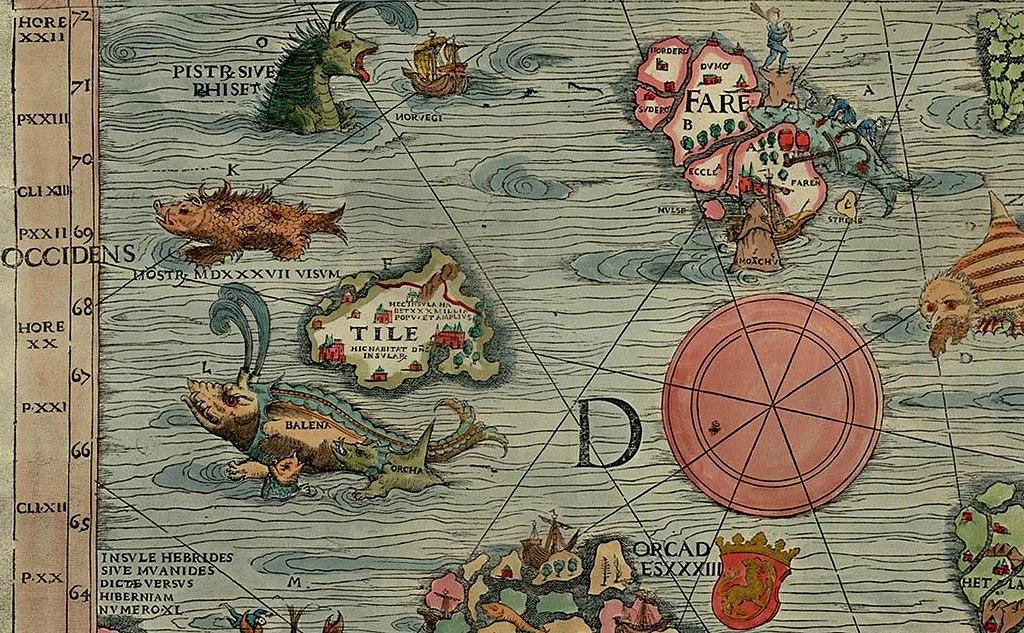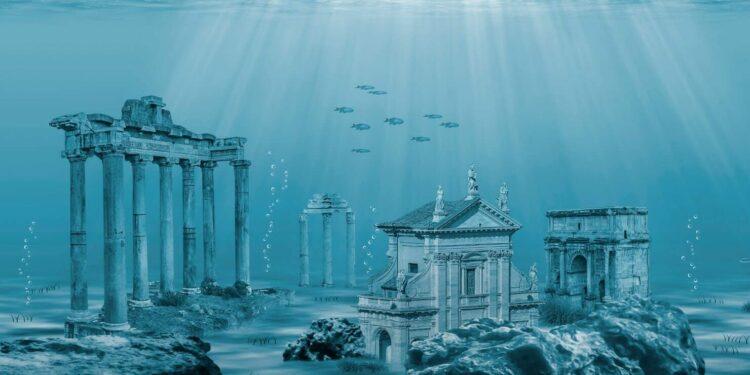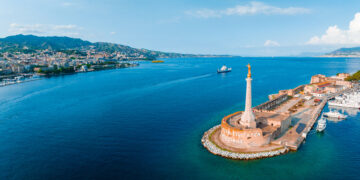Contents
Questo articolo è disponibile anche in:
For centuries, the lost land of Atlantis has been one of the places that have most fueled the curiosity of writers, explorers and scholars from all over the world. Mentioned for the first time by Plato centuries before the birth of Christ, this place has become a legend over the years, part of the collective imagination. Even today, it’s the main setting no longer just in the stories, but also in films, TV series, video games.
However, Atlantis is not the only lost island born from Greek legends: there are many others, lesser known, from the Fortunate Islands to Thule. The latter not only became part of the literary cycles of other cultures, but its name has become known even beyond our planet, linked to the space exploration, beyond our Solar System.
Atlantis, from Plato to present day
It was 360 BC when Plato, in his Timaeus, spoke of an island “larger than Libya and Asia combined”, located near the then feared borders known as the “Pillars of Hercules”. This island, nearly a continent, housed what was defined a perfect society, where harmony reigned since it was inhabited by “superior” men, far from human greed.
Singular was the structure of the island, managed, according to legend,s by Poseidon: it was formed by three circles of land and three of water, which narrowed towards a luxuriant centre. Ten were the kings who, appointed by the Greek god, met and made decisions on the administration of Atlantis, in harmony and justice.
But, according to Plato, this utopian state was not destined to last: “human” feelings such as violence and lust for power took possession of those “superior” men, who let themselves be bribed. No longer a perfect society, Atlantis was judged by Zeus himself; Plato tells, in Timaeus, how in one day and one night “terrible earthquakes and deluges […] occurred and the island of Atlantis, likewise submerged by the sea, disappeared”.
The research over the centuries
The legendary Greek island revived especially thanks to the heyday of Humanism; the discovery of America, an entire continent beyond all expectations and imagination, was seen as the success of an expedition in search of the lost island. However, it was soon understood that it could not be Atlantis: the ancient Greeks, in fact, had no knowledge of the Atlantic Ocean, nor of what lay beyond it.
The research, therefore, still continues today: there are many geographical points where scholars, over the centuries, have located the lost island, many of them in the Mediterranean basin. Precisely in this large area, in fact, numerous and catastrophic events have occurred, which would match the destruction of Atlantis narrated by Plato: just think of the explosion of the volcano of Thera, current Santorini, which devastated the entire island, causing, in part, the collapse.
The other lost islands
There are other lost islands told by Greek authors and entered into legend. Just think of the paradisiacal Pancaia, perhaps identified with what is now the island of Socotra, in the Indian Ocean. Still, in the same ocean, there would be Chryse and Argyre, islands whose soil, according to Pliny the Elder, would be made of gold and silver: this theory would have been supported by all those travelers who moved towards the East, the Cipangu, which Marco Polo described as full of rich metals, and which declined after the discovery of America, when travelers set out in search of the legendary El Dorado.
On the opposite side, in the Atlantic Ocean, according to Pliny the Elder, there would be the Fortunate Islands: a marvelous archipelago where everything grows so abundantly as to allow its inhabitants to live in absolute relaxation, without cultivating the land. Sometimes identified as the place of residence of the fallen heroes, the Elysian Fields, the Fortunate Islands have often been associated with the Canary Islands, actually existing and located in the Atlantic.
The myth of Ultima Thule
What lies at the end of the world that we know? Pytheas, Greek navigator who lived in the 4th century BC was among the first to explore northern Europe, Great Britain, and decided to go further, to the far north. This allowed him to be, in fact, the first to tell of the phenomena that naturally occur in extremely northern locations: the auroras, the frozen sea (which he called “gelatinous”, since it was a phenomenon never seen before), the midnight sun.
But on his way, about six days’ sail from the British island, Pytheas found himself facing an unknown island, which he called Thule: a place where the sun never set, where honey, wheat and milk were produced and consumed by its inhabitants. All around the island, according to Pytheas, the sea and the sky united as far as the eye could see, the earth ceased to exist; that’s why, this place was later called “Ultima Thule”: an island beyond which the known world ended, turning into a strange and unknown fog.

Today, Pytheas’ indications, subsequently reworked by numerous scholars, certainly point to Iceland: a land so far north where, effectively, the phenomenon of the midnight sun exists, characterized for the rest of the year by particularly long daylight days or, in the winter months, by a prevailing darkness. Other hypothesized that “Ultima Thule” could be located in the islands north of Norway; still other scholars suppose that Pytheas managed to reach Greenland.
However, the almost romantic myth of the end of the known world has a new meaning today: it is for this reason that when we speak of “Ultima Thule” we cannot help but think of the most distant object from Earth to have been explored to date , thanks to the New Horizons mission, the asteroid Arrokoth.
The name “Ultima Thule”, chosen temporarily, evoked a right air of mystery: located beyond the last known dwarf planet, Pluto, ideally evoked the end of the Solar System. The new name, on the other hand, is a tribute to the Powhatan culture: this object is and will be explored in the coming years by the New Horizons probe, which will then be set free in interstellar space, becoming one of the human artifices to head as far as possible from the Earth.
Myths and legends or truly existing places? From the lost land of Atlantis, still present in the collective imagination, to the islands at the end of the world: the ancient Greeks have left the modern world so much to reflect on, fantasize about, explore, and who knows if, somewhere, they are waiting only to be discovered, revealing their secrets.
Stay up to date by following us on Telegram!













